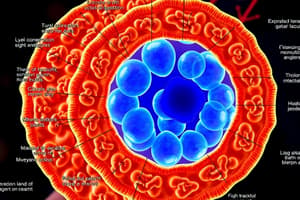Podcast
Questions and Answers
What is the basic unit of life in all living organisms?
What is the basic unit of life in all living organisms?
- Tissue
- Cell (correct)
- Organism
- Organ
Which process is responsible for producing energy in cells by breaking down glucose?
Which process is responsible for producing energy in cells by breaking down glucose?
- Photosynthesis
- DNA Replication
- Respiration (correct)
- Meiosis
What is the primary focus of genetics in biology?
What is the primary focus of genetics in biology?
- Structure and function of cells
- Study of genes and heredity (correct)
- Interaction between organisms and environment
- Processes of evolution
Which branch of biology studies the interactions between organisms and their environment?
Which branch of biology studies the interactions between organisms and their environment?
What mechanism drives evolution in populations of organisms?
What mechanism drives evolution in populations of organisms?
What is the process called by which plants convert light energy into chemical energy?
What is the process called by which plants convert light energy into chemical energy?
Which type of cell division results in four gametes that are genetically distinct?
Which type of cell division results in four gametes that are genetically distinct?
What term refers to the stable internal environment maintained by living organisms?
What term refers to the stable internal environment maintained by living organisms?
Flashcards
Biology definition
Biology definition
The study of living things and their interactions with each other and their environments.
Cell definition
Cell definition
Basic unit of life; all living things have cells.
Homeostasis definition
Homeostasis definition
Maintaining a stable internal environment.
Metabolism definition
Metabolism definition
Signup and view all the flashcards
Photosynthesis definition
Photosynthesis definition
Signup and view all the flashcards
Respiration definition
Respiration definition
Signup and view all the flashcards
Evolution definition
Evolution definition
Signup and view all the flashcards
DNA Replication definition
DNA Replication definition
Signup and view all the flashcards
Study Notes
Introduction to Biology
- Biology is the study of living organisms and their interactions with each other and their environment.
- It encompasses a vast array of topics, including cells, genetics, evolution, ecology, and more.
- The study of biology is crucial for understanding the natural world and addressing global challenges.
Fundamental Concepts
- Cells: The basic units of life; all living organisms are composed of cells, ranging from single-celled bacteria to multicellular organisms.
- Organization: Living organisms exhibit a hierarchical organization, ranging from molecules to cells, tissues, organs, organ systems, and ultimately the organism itself.
- Homeostasis: The ability of an organism to maintain a stable internal environment.
- Metabolism: The sum of all chemical reactions that occur within an organism to sustain life, including obtaining energy and nutrients.
- Genetics: The study of genes, heredity, and variation in living organisms.
- Evolution: The process by which populations of organisms change over time; driven by natural selection and adaptation.
- Reproduction: The biological process by which organisms produce offspring.
Branches of Biology
- Molecular Biology: Investigates the structure and function of biomolecules such as DNA, RNA, and proteins.
- Cell Biology: Studies the structure and function of cells, including their organelles and processes.
- Genetics: Focuses on genes, heredity, and variation.
- Developmental Biology: Explores the processes by which organisms develop from single cells to complex multicellular beings.
- Evolutionary Biology: Examines the processes of evolution, including natural selection and adaptation.
- Ecology: Studies the interactions between organisms and their environment.
- Physiology: Focuses on the functions of living organisms and their systems.
- Botany: The study of plants.
- Zoology: The study of animals.
- Microbiology: The study of microorganisms like bacteria, viruses, and fungi.
Key Processes
- Photosynthesis: The process by which plants convert light energy into chemical energy in the form of glucose.
- Respiration: The process by which cells break down glucose to release energy.
- Meiosis: A specialized type of cell division that produces gametes (sex cells).
- Mitosis: A type of cell division that results in two identical daughter cells.
- DNA Replication: The process of creating identical copies of DNA.
- Protein Synthesis: The process of creating proteins from DNA instructions.
Biological Diversity
- Living organisms exhibit a vast array of forms, functions, and adaptations.
- This diversity is a result of evolution and natural selection.
- Classifying organisms helps scientists understand relationships among different life forms.
Importance of Biology
- Understanding biological principles is essential for addressing global challenges like disease, climate change, and food security.
- Biology contributes to advancements in medicine, agriculture, and technology.
- It fosters respect and appreciation for the natural world.
Studying That Suits You
Use AI to generate personalized quizzes and flashcards to suit your learning preferences.




